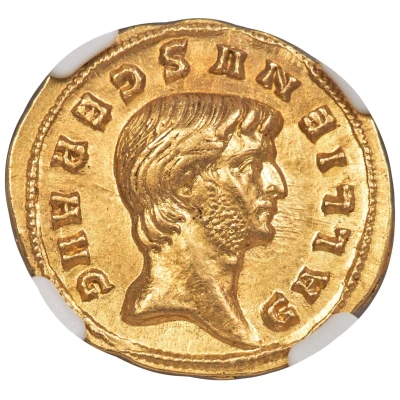


© Heritage Auctions
Aureus - Gallienus V-II•DES•COS•; Mediolanum
265 year| Gold | 4.18 g | 21 mm |
| Issuer | Rome › Roman Empire (27 BC - 395 AD) |
|---|---|
| Emperor | Gallienus (Publius Licinius Egnatius Gallienus) (253-268) |
| Type | Standard circulation coin |
| Year | 265 |
| Value | Aureus (25⁄2) |
| Currency | Antoninianus, Reform of Caracalla (AD 215 – 301) |
| Composition | Gold |
| Weight | 4.18 g |
| Diameter | 21 mm |
| Shape | Round (irregular) |
| Technique | Hammered |
| Orientation | Variable alignment ↺ |
| Demonetized | Yes |
| Updated | 2024-10-05 |
| Numista | N#380338 |
|---|---|
| Rarity index | 100% |
Reverse
Pegasus leaping right.
Script: Latin
Lettering: V-II•DES•COS•
Comment
Göbl 1232A.This extremely rare series is fascinating for several reasons - the portrait is unusual and exceptional, the obverse legend is unique, and the legend is engraved counterclockwise facing outward. Based on the legend, this was likely minted to commemorate Gallienus's journey down the Danube, traveling to Athens by ship as he was recovering from the wound inflicted during the war against Postumus. There are three reverse types in the series: ship, boar and Pegasus. The boar and Pegasus are both symbols for Legion II Adiutrix, which were stationed on the Danube.
Interesting fact
One interesting fact about the Aureus - Gallienus (V-II•DES•COS•; Mediolanum) (265) coin is that it features a unique blend of Roman and Greek influences in its design. The obverse side of the coin depicts the emperor Gallienus wearing a radiate crown and a cuirass, while the reverse side shows the goddess Victory standing on a prow, holding a wreath and a palm branch. This combination of Roman imperial imagery and Greek mythological symbols reflects the cultural exchange and blending that occurred during the Roman Empire's expansion into Greek territories.